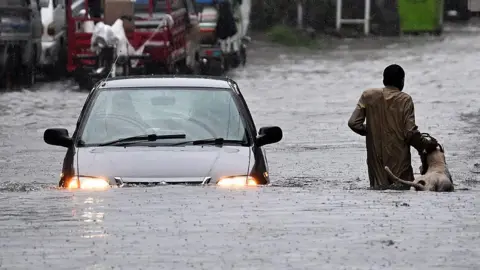Pakistan monsoon rains kill 63 in 24 hours
 Getty Images
Getty ImagesTorrential rains in Pakistan's Punjab province have killed at least 63 people and injured 290 in the 24 hours since downpours started on Wednesday morning.
Most of the victims were crushed by collapsing buildings, while the rest either drowned or were electrocuted, according to the National Disaster Management Authority.
Authorities in the city of Rawalpindi, next to the capital Islamabad, declared Thursday a public holiday to keep people at home, while those living near a swelling river which runs through the city have been asked to evacuate.
The latest deaths take the nationwide toll to nearly 180 since the monsoon started in late June. More than half of them were children.
The floods have closed several expressways throughout Punjab and either cancelled or delayed dozens of flights.
On Thursday, the province's Chief Minister Maryam Nawaz said an emergency had been declared in a number of areas. "Government institutions are working with utmost effort," she wrote in a post on X, urging residents to abide by safety guidelines.
In Chakwal, a city deluged by 400mm of rainfall in the past day, photographs and video showed rescue boats trying to locate people stranded in floodwaters.
Military helicopters can also be seen circling heavily flooded areas.
Punjab authorities have warned that more rains and flash floods are expected throughout the weekend. Thousands of rescuers across the province have been put on standby.
Pakistan, which has a population of nearly 250 million, is among the countries most vulnerable to climate change.
It bears the brunt of two major weather systems - one can cause high temperatures and drought, while the other brings monsoon rains.
Pakistan is also home to more than 13,000 glaciers which have been melting at an accelerated pace.
In 2022, monsoon floods submerged a third of the country and killed 1,700 people. They also left the country with economic damages exceeding $30bn.
In 2023, the United Nations Secretary-General had called for the international community to help the country recover from the catastrophic floods, saying it was "doubly victimised" by climate change and a "morally bankrupt" global financial system.
Additional reporting by Azadeh Moshiri in Islamabad
